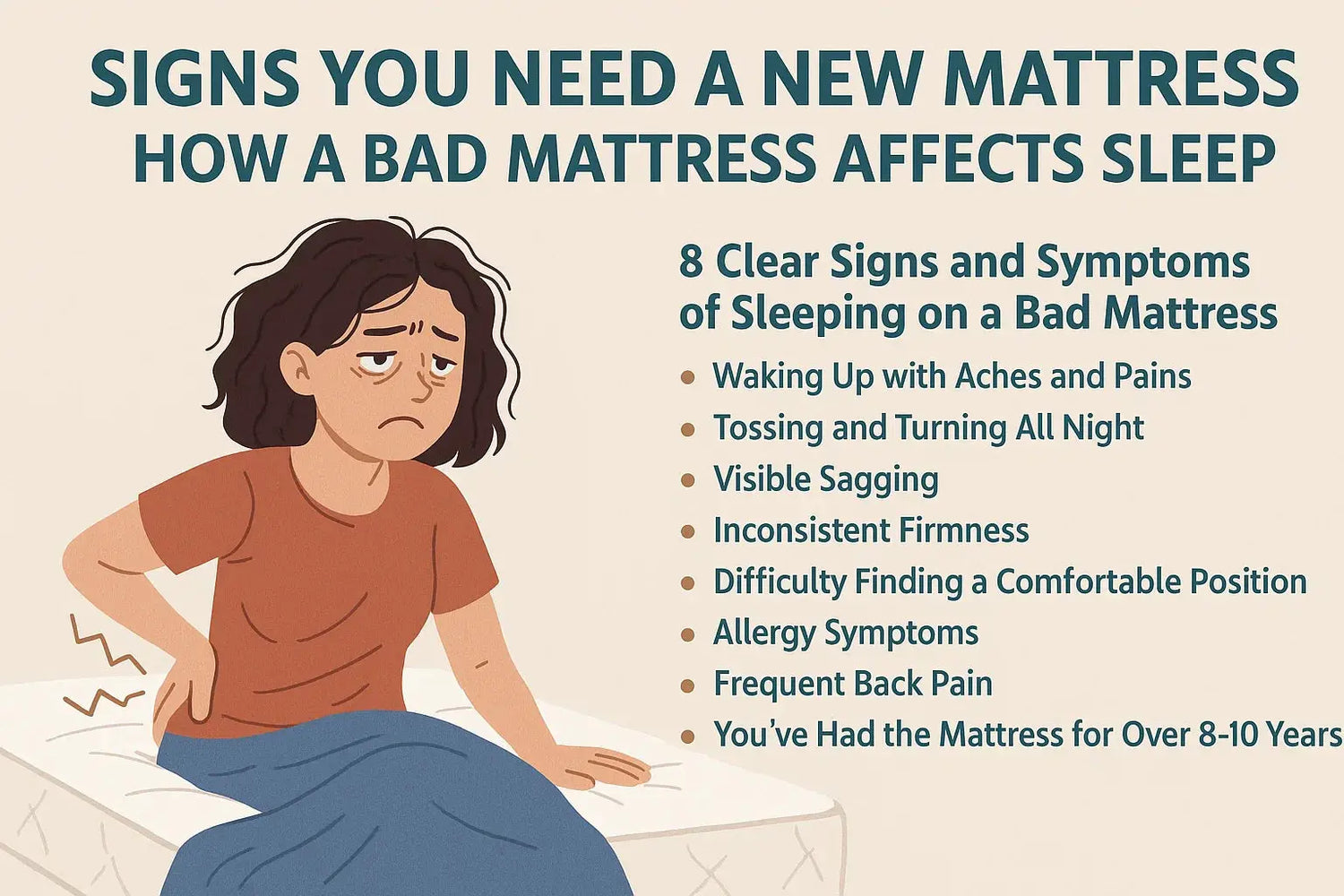
A good night’s sleep starts with the right mattress, but how do you know when it's time to replace yours? If you’re waking up with aches and pains, tossing and turning all night, or simply not feeling rested, your mattress could be the culprit. In this blog, we’ll walk you through the clear signs that indicate your mattress might be affecting your sleep quality and overall health. We’ll also discuss how a bad mattress impacts your body, when it’s time to upgrade, and how investing in a new mattress can help you sleep better and wake up refreshed.
8 Clear Signs and Symptoms of Sleeping on a Bad Mattress
A mattress plays a crucial role in how well you sleep and how rested you feel the next day. If you're waking up with discomfort or feeling tired despite a full night’s rest, it could be time to evaluate your mattress. Here are 8 clear signs that indicate you might be sleeping on a bad mattress:
-
Waking Up with Aches and Pains
A bad mattress can cause stiffness and soreness, especially in the neck, back, and hips, as it doesn’t provide adequate support. -
Tossing and Turning All Night
If you find yourself frequently changing positions due to discomfort, it might be due to the lack of support or firmness that suits your body type. -
Visible Sagging
If you notice noticeable sagging or indentations where you sleep, this means the mattress has lost its ability to evenly distribute weight. -
Inconsistent Firmness
A mattress that feels too soft or too hard in certain areas might not be supporting your body properly, leading to an uncomfortable sleep. -
Difficulty Finding a Comfortable Position
When a mattress fails to support your body’s natural alignment, it can be hard to get comfortable and fall asleep quickly. -
Allergy Symptoms
Old mattresses can accumulate dust mites, allergens, and bacteria, which can lead to respiratory issues and allergies. -
Frequent Back Pain
Poor spinal alignment from an unsupportive mattress can cause persistent back pain, especially in the lower back. -
You’ve Had the Mattress for Over 8-10 Years
Mattresses have a lifespan. After 8-10 years, the materials degrade, which can affect your sleep quality.

How Sleeping on a Bad Mattress Affects Your Sleep Quality and Health
A mattress that doesn't support your body properly can have a significant impact on both your sleep quality and overall health. Poor sleep can lead to fatigue, reduced cognitive function, and a weakened immune system. Additionally, the aches and pains caused by an unsupportive mattress can result in chronic discomfort, which could hinder your daily activities. Long-term poor sleep due to a bad mattress may also contribute to mental health issues such as stress and anxiety.
Is Your Mattress Too Hard or Too Soft?
Finding the right firmness for your mattress is essential. A mattress that is too soft won’t provide enough support for your spine, leading to misalignment and discomfort. On the other hand, a mattress that is too firm can put unnecessary pressure on your joints and cause pain. The ideal mattress firmness varies depending on your sleep position and body type. For example, side sleepers may prefer a softer mattress, while back and stomach sleepers often benefit from a firmer surface.
When You Should Consider Replacing Your Mattress
It might be time to replace your mattress if you notice:
- Regular discomfort or pain upon waking.
- Persistent issues like allergies or snoring that could be linked to the mattress.
- Wear and tear such as sagging or lumps.
- If you’ve had the mattress for more than 8 years, as it may have reached the end of its lifespan.
Get the Support You Need by Upgrading Your Old Mattress
Upgrading your mattress can significantly improve your sleep quality and overall health. Consider mattresses that offer advanced support technologies like the Anmiz-Y™ foam, which provides optimal spinal alignment and comfort. Whether you're dealing with back pain, sleep disturbances, or simply need an upgrade, investing in a new mattress is an essential step to ensuring you wake up feeling refreshed.
Suggested Table:
| Sign of a Bad Mattress | Solution |
| Waking up with aches and pains | Upgrade to a mattress with better support, like Anmiz. |
| Tossing and turning all night | Choose a mattress that aligns with your body and sleep position. |
| Visible sagging | Consider a new mattress with durable materials to prevent sagging. |
| Difficulty finding a comfortable position | Look for mattresses with customizable firmness and zoned support. |
| Allergy symptoms | Use a mattress with hypoallergenic properties and a breathable cover. |
| Frequent back pain | Invest in a mattress designed for spinal alignment, such as Anmiz-Y™. |
| Mattress age over 8 years | Replace your mattress every 8-10 years for optimal support. |















